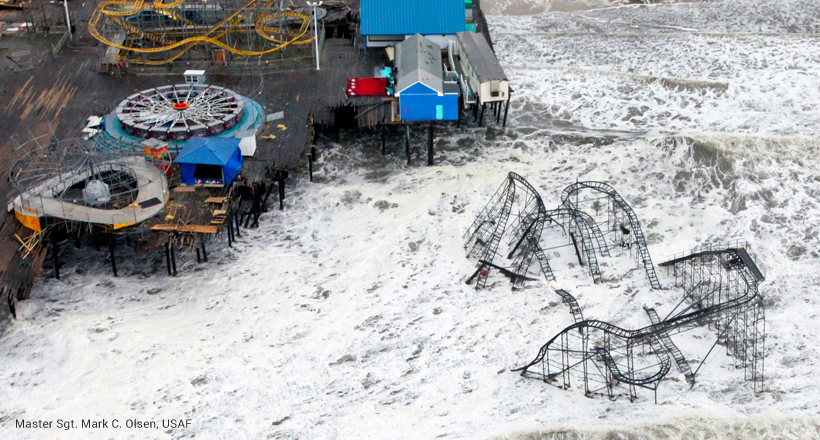PUBLIC OPINION
A Decade After Sandy, New Jerseyans Believe in Climate Change, See It as a Threat
There is support for various climate-related policies, but not how to pay for it
EAGLETON CENTER FOR PUBLIC INTEREST POLLING – As the 10-year anniversary of Hurricane Sandy approaches and more than a year out from Hurricane Ida, the vast majority of New Jerseyans believe the Earth’s climate is changing, see it as a serious threat to the state, and are concerned about the effects of changing climate conditions on various aspects of life, according to the latest Rutgers-Eagleton poll.
This latest poll was conducted in partnership with the New Jersey Climate Change Resource Center, the New Jersey State Policy Lab, the Rutgers Climate Institute, and the Rutgers Coastal Climate Risk and Resilience Program. Read the full report here.
According to the poll:
• New Jerseyans are more positive than negative about the state’s level of preparedness for extreme weather events: 14 percent say the state will be “very” prepared and 62 percent say “somewhat” prepared for storms like Sandy and Ida in the next 5 to 10 years.
• Two-thirds say extreme flooding is happening more often (65 percent), and half perceive a greater frequency in storms like Sandy and Ida (52 percent) and nonstorm-related coastal flooding because of high tides and winds (50 percent).
• Seventy-eight percent believe the Earth’s climate is changing; almost the same number see changing climate conditions as a serious threat to New Jersey (45 percent “very serious,” 27 percent “somewhat serious”).
• Among registered voters, nearly seven in 10 say the issue of Earth’s changing climate is “very” (41 percent) or “somewhat” (27 percent) important to their vote in the upcoming midterm election.
“The 10th anniversary of Sandy is a reminder for New Jerseyans of how far the state has progressed when it comes to climate resiliency and preparedness and – as they notice an uptick in extreme weather-related events – how much further it has to go,” said Ashley Koning, an assistant research professor and director of the Eagleton Center for Public Interest Polling (ECPIP) at Rutgers University–New Brunswick. “New Jerseyans believe climate change is happening and even consider it important to their vote in November, but the paradox of the past decade remains: residents wholeheartedly want to see more climate-related action but do not want to be personally burdened with the responsibility.”
New Jerseyans are supportive of the state enacting various policies related to changing climate conditions and agree the state should commit to reducing carbon emissions to as close to net-zero as possible by the middle of this century.
• Specifically, New Jerseyans support:
o requiring real estate transactions to disclose flood vulnerability to potential buyers (91 percent), reinforcing infrastructure to withstand the effects of climate change (89 percent), investing in natural systems to buffer climate impacts (88 percent), requiring towns and cities to develop local plans for future climate-related events (86 percent), creating regulatory standards for development and redevelopment in flood-prone areas (84 percent);
o strengthening building codes to require resilience for new construction or major renovation (78 percent), requiring homeowners and business owners in risky areas to buy insurance that will pay for future flood damage (68 percent);
o requiring investments using state and federal dollars to take into account resiliency measures to address changing climate conditions (66 percent), using public funds to replenish and widen beaches (63 percent), and requiring buildings be elevated (60 percent).
• Eighty percent say the state government should be required to include specific plans for infrastructure to withstand changing climate conditions and extreme weather events.
• Forty-three percent of residents say the government should try to reduce greenhouse gases voluntarily with incentives, while 26 precent say the government should impose limits on the sources of greenhouse gases.
• Sixty-eight percent say New Jersey should commit to reducing carbon emissions to as close to net-zero as possible by the middle of this century.
• Residents are more supportive of the state helping those in lower- and middle-income areas rebuild or relocate (62 percent), compared with those in upper-income areas (37 percent).
• Twenty-six percent say the state government should prohibit building or rebuilding in flood-prone areas, 22 percent say the state government should encourage people not to build or rebuild with financial incentives, 27 percent say the state should do both, and 21 percent say it should do neither.
• Most residents say the state should legally dedicate funds to support climate preparedness efforts (69 percent) and clean energy programs (64 percent) that cannot be used for other purposes.
“This poll affirms that New Jersey residents understand that climate change affects them now, and they overwhelmingly support state action to keep them out of harm’s way, while at the same time supporting the need to reduce carbon emissions in line with the Paris Agreement to net zero by mid-century,” noted Marjorie Kaplan, co-director of the New Jersey Climate Change Resource Center.
“New Jerseyans are increasingly concerned about the impact that changing climate conditions will have on them, personally. Not only are they strongly committed to actions that will prepare their communities for future climate conditions but they are also strongly supportive of actions that will reduce climate emissions substantially,” said Jeanne Herb, co-director of the New Jersey Climate Change Resource Center
However, New Jerseyans are hesitant to pay for any of these climate-related actions or policies themselves and would instead like to see the financial burden mostly on the federal government and business corporations, especially those that produce and use fossil fuels.
• In terms of who should pay a “major share” of the added costs to make New Jersey more resilient to climate change, 68 percent say the federal government, 59 percent say companies that generate power using fossil fuels, 58 percent fossil fuel companies and producers, 55 percent say the state government, 23 percent say companies that generate power without using fossil fuels, and 22 percent say their local government.
• Forty-five percent say upper-income residents living in risky areas such as flood zones should pay a “major share.” Only 11 percent say the same about those using gasoline-powered cars, 9 percent about lower- and middle-income residents who live in risky areas like flood zones, and 8 percent about all residents.
• Fifty-four percent of residents prefer to continue funding roads, bridges, and government buildings at the current cost and 39 percent are willing to pay a little more in taxes to make these structures better able to withstand severe weather events.
Because of the impact of changing climate conditions, 76 percent say it is likely they will have to pay more for consumer goods and services, 75 percent that they will have to pay more in utility bills, and 70 percent that they will have to pay more in property taxes. Seventy-five percent think the state will need to increase funding for disaster relief to pay for disasters and extreme weather events.
“New Jerseyans are largely supportive of climate resiliency measures, but, unsurprisingly, they don’t want the funding coming out of their own pockets, especially in a time of rising inflation,” said Jessica Roman, a research associate at ECPIP. “Aside from the federal government, residents think more of the financial onus should be on larger, more obvious emissions producers like companies using and producing fossil fuels, rather than individual people. And they are dissatisfied with the work these entities are doing thus far in response to changing climate conditions.”
When it comes to who is obligated to address climate change and how various entities are doing, New Jerseyans assign the most responsibility to, and are the most dissatisfied with, business operations and industry, the United States government, and fossil fuel companies.
• A majority assigns “a lot” or “some” responsibility to business corporations and industry (81 percent), the federal government (80 percent), fossil fuel companies (77 percent), developed and industrialized nations outside the U.S. (74 percent), New Jersey’s own state government (74 percent), car manufacturers (73 percent), the media (72 percent), individual people (72 percent), and developing countries (70 percent).
• When it comes to the job various entities are doing on climate change, most are dissatisfied with the media (72 percent), followed by the federal government (69 percent), fossil fuel companies (67 percent), business corporations and industry (65 percent), developed and industrialized nations outside of the U.S. (64 percent), individual people (58 percent), developing countries (53 percent), New Jersey’s state government (51 percent), car manufacturers (48 percent) and local government (45 percent).
The results are from a statewide poll of 1,002 adults contacted by live interviewers on landlines and cell phones from Oct. 14 to Oct. 22. The full sample has a margin of error of +/- 4.0 percentage points.



 Angel Alguera
Angel Alguera Daniel Gilkeson
Daniel Gilkeson Benjamin Goldberg
Benjamin Goldberg Surya Jacob
Surya Jacob Vineesh Das Kodakkandathil
Vineesh Das Kodakkandathil Douglas Leung
Douglas Leung Nihar Mhatre
Nihar Mhatre Justin Morris
Justin Morris Josephine O’Grady
Josephine O’Grady Jessica Parineet
Jessica Parineet Dillan Patel
Dillan Patel Moira Sweeder
Moira Sweeder